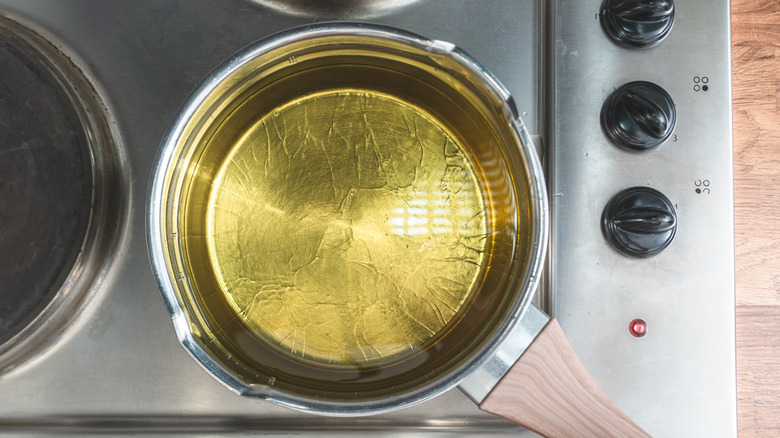The Reason Wolfgang Puck Doesn't Cook With Expensive Olive Oil
Olive oil is the king of the pantry, thanks to its versatility in the kitchen. Whether you choose a specific brand of oil or opt for whatever's on hand, olive oil appeals to a wide range of recipes — as well as people. Olive oil has become such a popular commodity that its global market value amounted to 10.5 billion dollars in 2022 and is expected to increase to 14.9 billion by 2030 (via Globe News Wire).
That's a lot of olive oil — and, therefore, a lot of cooking. While olive oil is useful in the kitchen, some bottles are better for cooking than drizzling ... and vice versa. Stop by any supermarket, and you'll be confronted with a range of similar (but not quite the same) oils with distinctive purposes and flavors. The ideal brand and grade are ultimately up to the chef, but there are some situations in which it may be best to forgo that fancy bottle.
Celebrity chef Wolfgang Puck actually prefers not to cook with ultra-pricy and flavorful olive oils. Cooking with the fancy stuff isn't worth it — not necessarily because of its price tag but because of what happens once the oil warms.
Keep your best olive oils off the heat to avoid burning
Save your fanciest olive oils (sometimes called finishing oils) for a crisp side salad or burrata and tomato Caprese. The priciest olive oils tend to be those of the utmost quality, typically cold-pressed and graded extra virgin. According to Wolfgang Puck, these expensive olive oils are best kept off the stove because once you heat them, the particles they contain burn (via MasterClass).
This heating process neutralizes the desirable, tangy flavor of good EVOO, essentially nullifying the extra cost. Southern Living echoes Puck's reasoning, noting that expensive extra virgin olive oil is intended to be enjoyed in its purest (not-heated) form. Once heated, the flavors of the olive oil wane. So, you're better off sautéing with olive oil that's already less flavorful to begin with.
Granted, you don't have to skimp on the fancy stuff altogether. According to Real Simple, splurging on a nicer olive oil is, indeed, worth it, so long as it's kept intact; the best, cold-pressed oils offer simple and easy solutions to brighten the taste of any dish. They'll likewise keep well on the shelf. All the more reason to store a couple, different bottles of olive oil on your shelves.

